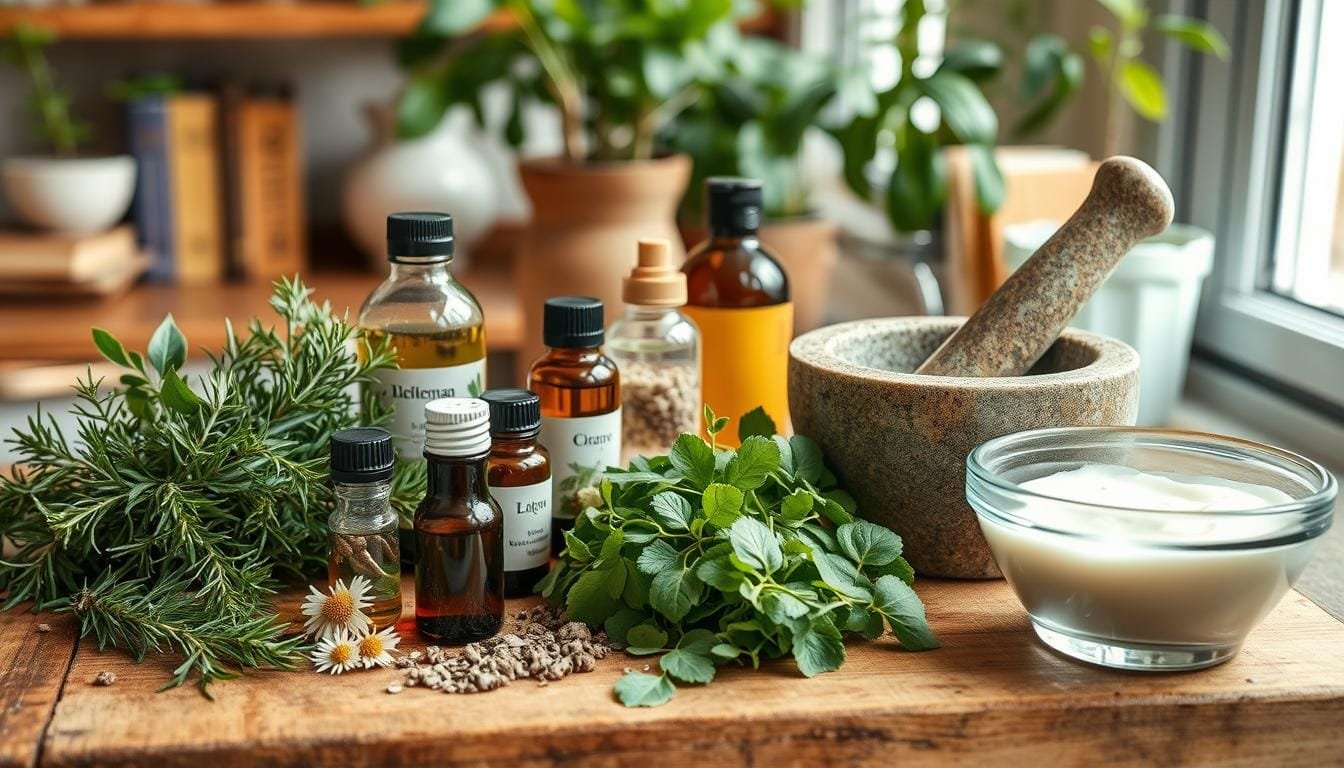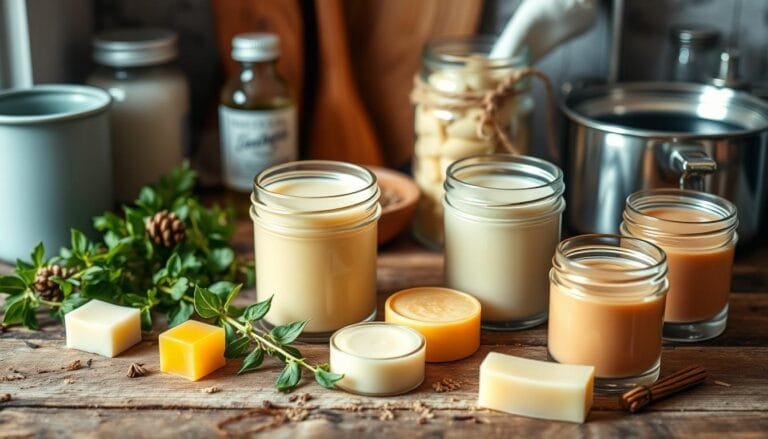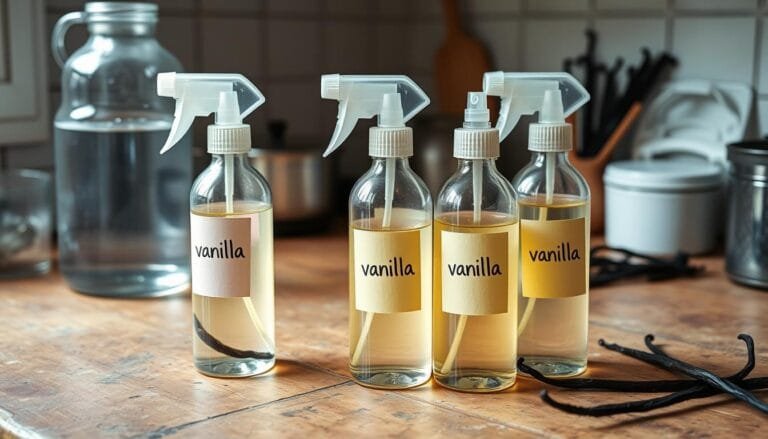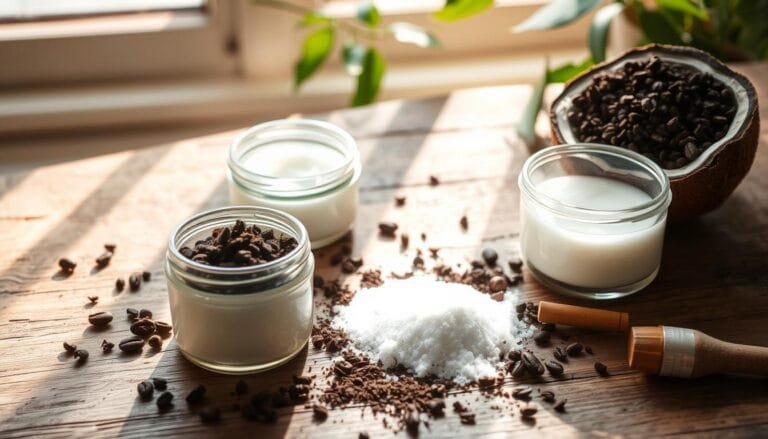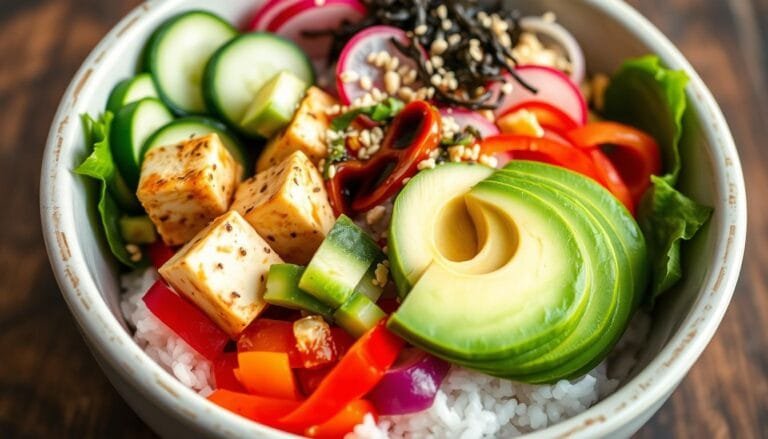I’ve become more aware of what’s in my personal care products. Making my own natural herbal shampoo has been a game-changer. It lets me tailor the shampoo to my hair and scalp. Plus, it’s free from harsh chemicals found in store-bought shampoos.
Making natural herbal shampoo is easy. You just need a few ingredients like castile soap, coconut milk, essential oils, and dried herbs. These natural elements help me create a shampoo that’s good for my hair. It’s a fulfilling process that makes me feel confident about my hair care.
In this article, I’ll show you how to make your own herbal shampoo. We’ll talk about the benefits of natural hair care. And, I’ll share tips on making the shampoo work best for your hair and scalp. Get ready to ditch harsh chemicals and embrace nature’s power in your hair care.
Understanding the Benefits of Natural Herbal Shampoo
Switching to natural herbal shampoos has many benefits for your hair and the planet. They cut down on synthetic chemicals and preservatives. This makes them a greener choice.
Environmental Benefits
Natural herbal shampoos often come in recyclable bottles. This helps reduce waste and supports eco-friendly hair care. The plant-based ingredients are also biodegradable, so they don’t harm the environment when they go down the drain.
Health Advantages for Hair and Scalp
Herbal shampoos are good for your scalp health. They help with dandruff and encourage healthy hair growth. The natural ingredients used are chosen for their nourishing and rejuvenating effects. They help keep your hair shiny and vibrant.
Cost-Effectiveness of DIY Solutions
Creating your own homemade herbal shampoo can save money. You can buy ingredients in bulk and tailor the recipe to your hair type. This sustainable beauty method lets you control what goes into your shampoo, ensuring your hair gets the best care.
“Herbal shampoos can nourish the scalp, address various hair concerns, and provide a more eco-friendly hair care solution.”
Essential Base Ingredients for Homemade Herbal Shampoo
Creating your own natural herbal shampoo starts with the right base ingredients. You’ll need liquid castile soap for cleaning, coconut milk for moisture, and carrier oils like olive, avocado, or jojoba for nourishment.
Adding herbal infusions is key to a great natural shampoo. These botanicals can help with oiliness, dandruff, and more. Some recipes also include baking soda or apple cider vinegar for extra cleansing and pH balance.
Customizing your shampoo base is easy, depending on your hair type. Whether it’s dry, oily, or sensitive, you can make a shampoo that makes your hair soft, healthy, and vibrant.
“I’ve been using this homemade herbal shampoo for a few months now and I love it! My hair has never felt so clean and nourished. The natural ingredients are so much gentler than commercial products.”
With creativity and the right mix of castile soap, coconut milk, carrier oils, and herbal infusions, you can change your hair care game. Enjoy the benefits of a natural, customized shampoo.
Choosing the Right Herbs for Your Hair Type
Choosing the right herbs for your homemade herbal shampoo is key. Different herbs can help with oily, dry hair, and dandruff. Knowing which herbs are best for your hair lets you make a shampoo that works well.
Herbs for Oily Hair
For oily hair, try using rosemary, sage, or lemon peel. These herbs help control oil and make your hair feel clean and balanced.
Herbs for Dry Hair
Herbs like chamomile, calendula, or comfrey are great for dry hair. They moisturize and nourish, making your hair healthier and more hydrated.
Herbs for Dandruff Control
For dandruff, add tea tree, thyme, or oregano to your shampoo. These herbs fight fungal and bacterial causes of dandruff, making your scalp feel clean.
Other good herbs for hair include lavender, nettle leaf, and plantain. They offer special benefits for healthy hair and scalp. You can use fresh or dried herbs, making a shampoo that meets your hair’s needs.
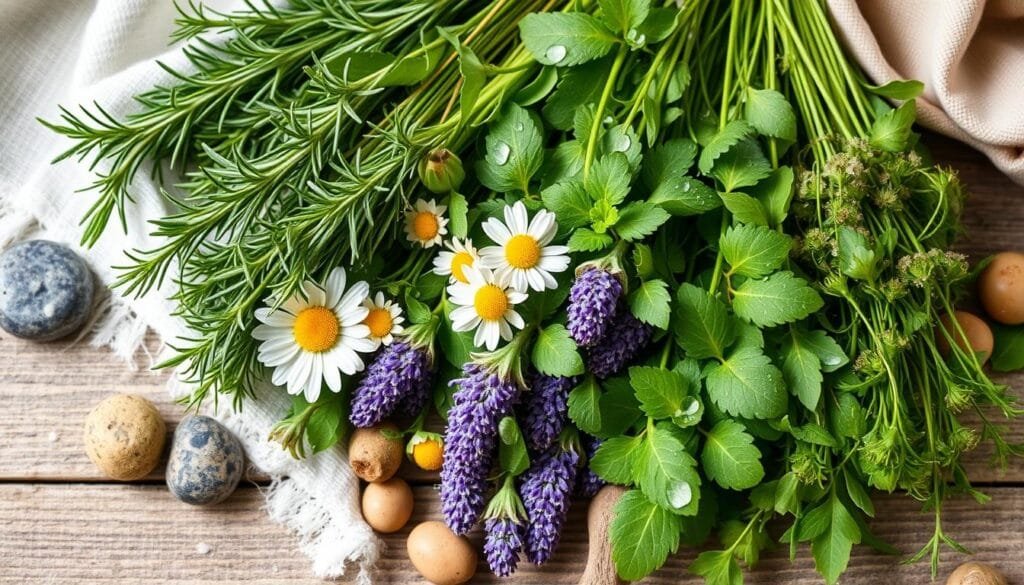
“The right combination of herbs can transform your hair, leaving it nourished, balanced, and radiant.”
The Role of Carrier Oils in Natural Shampoo
Carrier oils are key in making homemade herbal shampoos. They nourish and moisturize your hair. These oils fight dryness, add shine, and boost scalp health. You can choose from jojoba oil, argan oil, and tamanu oil for your moisturizing shampoo.
Carrier oils come from plants and offer special benefits. Coconut oil is great for scalp issues like dandruff. It has antibacterial and antifungal properties. Argan oil is a strong moisturizer for very dry hair because of its high linoleic acid.
The right amount of carrier oil depends on your hair type. If you have oily hair, use less. Dry hair needs more. Try different amounts to find what works best for you.
“Carrier oils are part of traditional hair care treatments, indicating a long-standing historical preference for botanical oils in hair care routines.”
Using carrier oils in your shampoo can change your hair care routine. It gives your hair the nourishment, hydration, and shine it needs. Let nature help you make your hair care products the best they can be.
Essential Oils and Their Benefits for Hair Care
Essential oils open up a new world in natural haircare. They can help with hair growth and fight dandruff. Let’s explore the best oil mixes, how to dilute them, and safety tips.
Best Essential Oil Combinations
Some essential oil blends work better together. A study showed that lavender, thyme, rosemary, and cedarwood oils helped with hair loss. 44% of participants saw improvements, compared to 15% in the control group.
Another study found that lavender, thyme, rosemary, cedarwood, and evening primrose oils boosted hair growth. 75% of participants experienced better hair growth, while 30% in the placebo group did.
Tea tree oil is great for fighting dandruff, reducing it by 41% compared to 11% in the placebo group. It also kills head lice and their eggs. Geranium oil helps with hair growth by regulating growth factors and cellular response.
Proper Dilution Ratios
Using essential oils requires careful dilution. Start with a few drops of essential oil per ounce of carrier oil like jojoba or coconut oil. Gradually add more based on your skin’s sensitivity. This ensures the oils are gentle and effective without causing irritation.
Safety Considerations
Essential oils are beneficial but must be used with caution. Be careful during pregnancy or if you have sensitive skin. Always do a patch test before applying them to your skin. If you’re unsure, talk to a healthcare professional.
Some essential oils, like lavender and peppermint, can interact with medications. So, it’s important to research and use them responsibly.
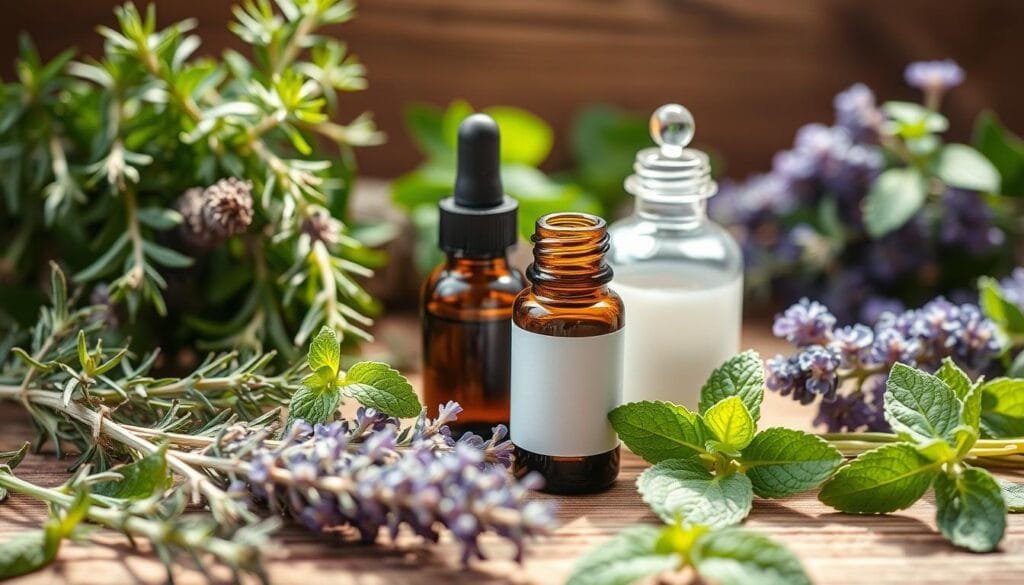
By using essential oils wisely, you can make your hair healthier and more vibrant. Try different mixes, dilute correctly, and always think about safety. Your hair will appreciate it.
Step-by-Step Guide to Making Homemade Herbal Shampoo
Making your own DIY shampoo recipe with natural herbal infusions is rewarding. It helps you get shiny, healthy hair. First, pick your favorite herbs like soap nuts, gooseberry, and aloe vera. Then, steep them in hot water to make a strong herbal infusion.
After that, mix the herbal infusion with castile soap and carrier oils like coconut or jojoba. Add a few drops of your favorite essential oils. For longer shelf life, use a natural preservative like Leucidal SF Max. Pour the mix into a clean, recycled shampoo bottle. Shake it well before each use to mix the ingredients.
- Prepare the herbal infusion by steeping your chosen herbs in hot water for 30-60 minutes.
- Strain the infusion to remove any solid plant material, reserving the liquid.
- In a separate bowl, combine the herbal infusion, castile soap, carrier oils, and essential oils, stirring gently to incorporate.
- If desired, add a natural preservative like Leucidal SF Max to extend the shampoo’s shelf life.
- Transfer the mixture to a clean, recycled shampoo bottle or dispenser, and shake well before each use.
Enjoy your homemade, natural hair wash. You’ll feel good knowing what’s in your hair care routine.
Natural Preservatives and Shelf Life Tips
Natural preservatives are key to keeping homemade herbal shampoo fresh. Without them, your shampoo might only last 1-2 weeks in the fridge. But with preservatives like Leucidal SF Max, it can stay good for 3-4 months at room temperature.
Storage Requirements
For your shampoo to stay potent, store it in a cool, dark spot. Heat, light, and air can break down the ingredients fast. Use a tightly sealed container and keep it away from sunlight or heat.
Signs of Spoilage
Watch for color, smell, or texture changes in your shampoo. These could mean it’s gone bad. If you see anything odd, it’s safer to throw it away.
Using clean tools and containers helps avoid contamination. This simple care can make your homemade shampoo last longer. Enjoy your natural shampoo for months.
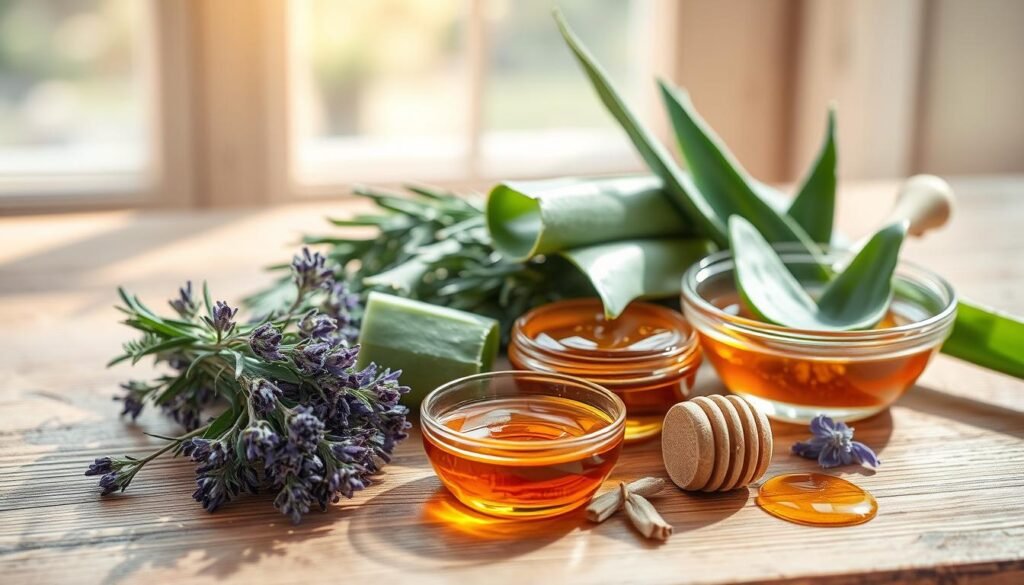
“Proper storage and preservation are key to ensuring your homemade herbal shampoo remains fresh and effective for as long as possible.”
Customizing Your Herbal Shampoo Recipe
I love personalized hair care and custom shampoo formulas. The secret to the perfect hair type specific homemade herbal shampoo is tailoring it to your hair. Everyone’s hair is different, so what works for one might not work for another.
Start by adjusting the base recipe for your hair type. If you have oily hair, add more cleansing herbs like Shikakai and Aritha. For dry hair, add more nourishing ingredients like Bhringaraj powder and organic oils.
- Try different herb combinations to find your favorite. Rosemary is great for brunettes, chamomile for light hair, and hibiscus for a burgundy tint.
- Essential oils can also make a big difference. A few drops of lavender, cedar wood, or rosemary can change the scent and effectiveness of your shampoo.
- Keep notes on what works for your hair. Feel free to make changes until you get the results you want.
Creating your own personalized hair care products lets you customize everything. So, be your own alchemist and find your perfect custom shampoo formula for hair type specific happiness!
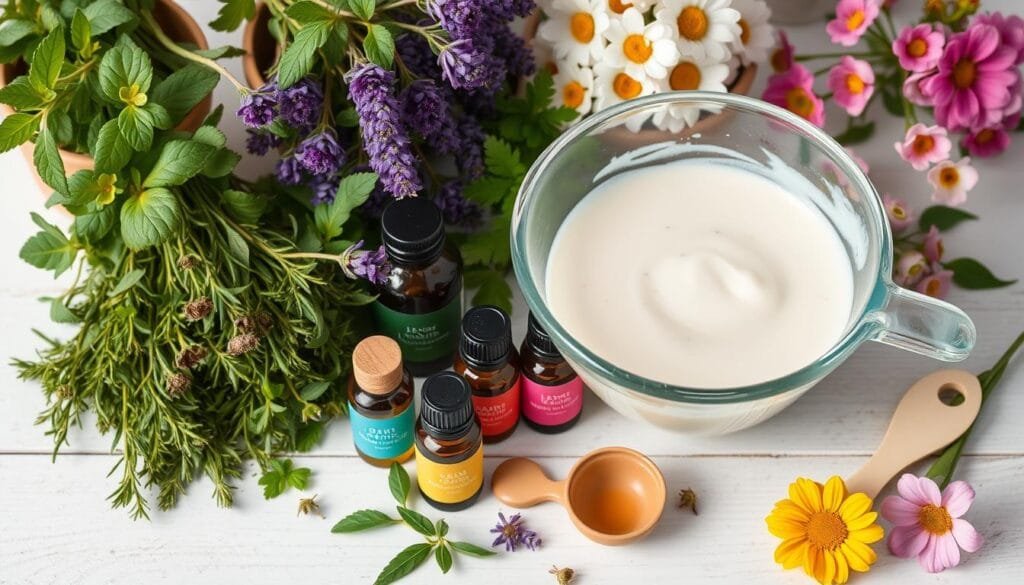
Transitioning from Commercial to Natural Shampoo
Switching to natural shampoo is rewarding but takes patience. Your hair and scalp will adjust to the gentler formulas. You might notice changes that are normal.
The natural hair transition can make your scalp produce more oil at first. This can last weeks to months. It’s your scalp’s way of adjusting to the new, chemical-free shampoo.
During this detox period, your hair might feel oily or waxy. This is just your scalp adjusting to the change. It’s not a reason to worry.
- Your scalp might not produce enough oil, causing dryness and itching.
- Switching to natural hair care can help your scalp find the right oil balance in about three months.
To ease the transition, try an apple cider vinegar rinse. It balances pH levels and removes residue. Stick with your new shampoo, even when it’s hard. Your hair and scalp will thank you with healthier, more vibrant locks.
“The transition to natural hair care is a journey, but one that’s well worth the effort. Be patient, and trust that your hair and scalp know what’s best.”
Everyone’s experience is different. Listen to your hair and scalp and adjust as needed. With time and effort, you’ll enjoy the perks of natural, homemade shampoo.
Complementary Hair Care Practices and Rinses
Take your natural hair care to the next level with some extra steps. An apple cider vinegar rinse is a game-changer. It balances your scalp’s pH, making your hair shiny and easy to manage.
Herbal hair rinses are also a hit. For light hair, a chamomile rinse is perfect. It soothes and nourishes. Dark hair benefits from a rosemary rinse, which promotes growth and fights dandruff.
Using natural dry shampoo between washes is smart. It keeps your hair fresh and extends your shampoo’s life. Plus, scalp massages boost hair growth and strengthen your scalp.
